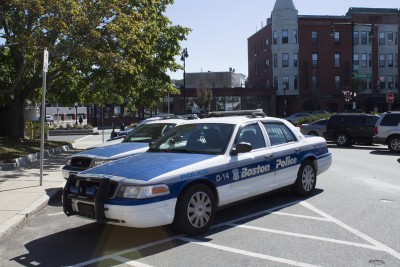
One hundred Boston Police Department officers and seven command staff members on Monday began participating in a six-month body camera pilot program, according to a Monday press release.
The program was put in effect after a judge in the Suffolk Superior Court on Friday declined the Boston Police Patrolmen’s Association’s request to make the body camera voluntary.
BPD Superintendent-in-Chief William Gross said in the release that the program aims to enhance police transparency and gain the public’s trust.
“Cameras are going to show folks just how difficult the job of a police officer really is,” Gross said in the release, “while — at the same time — exposing and highlighting the widespread professionalism that exists in Boston Police Department.”
The program was initially optional; however, after no officers stepped forward, the city made the program mandatory. Led by President Patrick Rose, the BPPA refuted the program’s involuntary basis and filed a lawsuit against the city on Aug. 26, and the trial began on Sept. 6, The Daily Free Press reported.
In the days following the conclusion of the trial, the BPPA could not be reached for comment.
The Friday ruling was based on evidence that BPPA deliberately discouraged its members from volunteering in the pilot program.
Segun Idowu, co-founder of Boston Police Camera Action Team, wrote in an email that the group is pleased with the ruling, which Judge Douglas Wilkins presided over, and will push for a permanent body camera requirement.
“We have always believed that Patrick Rose and his executive leadership team did not, and do not, represent the views of the majority of his members,” Idowu wrote. “It is the first time in our lives that we have witnessed a union totally disregard what its members want in order to satisfy selfish desires.”
Carl Williams, attorney for the American Civil Liberty Union of Massachusetts, said he supports the body camera program, as police accountability and transparency are essential.
“It should be mandatory,” Williams said. “We’re hopeful that at the end of the pilot project the city and the Boston Police Department will equip all Boston police officers to have interactions with the public with body cameras.”
Williams said following recent incidents of police brutality, there should be a nationwide certification for police officers and regulations that strip them off their jobs for violent acts.
“Now what happens is, if someone commits an act of violence, and they get fired from their police department, then they just go to another place that doesn’t look for such things, and they just get another job as a police officer,” Williams said. “It’s important that the people of Boston and people anywhere … have constitutional right by the First Amendment to record the police.”
Several men of color were killed by police in Louisiana, Minnesota and Texas in July. Following the incidents, Boston-based group Mass Action Against Police Brutality held a rally with 1,000 people from BPD headquarters to Dudley Commons to commemorate those slain by police.
Several Boston residents said they support the requirement for officers to wear body cameras, as it can increase the public’s trust in the police.
Michael Sampson, 47, of the South End, said police officers using body cameras can increase transparency and prompt them to behave better.
“They’re not necessary by any means, but I don’t think America will hear the end of racial tension and the police force until cameras are instilled on every cop,” he said. “It’s up to the cop then to behave with the camera, which he should.”
Lauren Donalson, 25, of South Boston, said the body camera requirement should be implemented on more police officers.
“A hundred body cameras are a good number to start with,” she said. “But then people seem to forget that we have thousands of cops in Boston, so we definitely have a long way to go.”
James Marin, 26, of Brighton, said the arguments against the body camera requirement do not make sense, as they contradict the police’s responsibilities.
“With all the controversies going on, police brutality, I would be for it,” he said. “What kind of privacy do you want when you’re on the job?”






















































































































